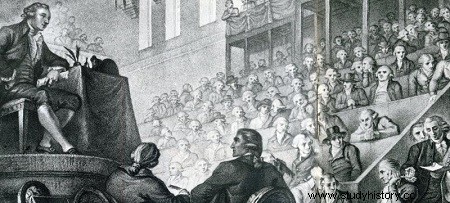
Assembly on October 1, the Legislative Assembly, elected by universal suffrage, amid general indifference, fairly well reflects the political tendencies expressed within the Constituent Assembly:264 Feuillants; 350 Impartials; 136 Jacobins (Girondins plus Montagnards). But, at the time when the Legislative Assembly met, France was in the throes of extremely strong internal tensions. Royalists and revolutionaries are sharpening their weapons, and emigration, upsurge since Varennes, maintains a climate of insecurity, exploited by the partisans of the Revolution to excess.
From October 1791, Louis XVI will have to form a cabinet. This ministry, of Feuillantine tendency, will not take long to find itself out of step with the Assembly, closely watched by the municipality, ready at the slightest alert to trigger a popular riot. During the month of November, the Legislative Assembly nevertheless adopted a certain number of measures, the most famous of which remain the law on emigrants (these being ordered to return to France before January 1, 1792, at the risk of being confiscated). all their property), and the law on refractory priests, according to which every man of the Church must take, within eight days, a civic oath, under penalty of seeing his pension canceled and of finding himself suspect in the eyes of the authorities. Louis XVI immediately vetoed these two decisions of the Assembly. Irritated by this refusal and by the dismissal of Narbonne, the Legislative made itself threatening and impeached Lessart, forcing the king to separate from his feuillant ministers and to form a cabinet of Gironde inspiration.
Immediately, the newly constituted ministry embarked on the process of declaring war on the old monarchical Europe. This conflict, it should not be forgotten, was desired, in the first place, by Louis XVI. The king, betting on a French defeat, thought he would thus obtain a withdrawal from the Revolution. But the war was also wanted by men such as La Fayette and his political friends, young officers for the most part, speculating on a French victory which would have made it possible to stop the revolutionary slippage of the year 1792.
On the other hand, among the opponents of the conflict, there are men of the left wing, such as Robespierre who, perceiving the royal aims, would prefer to fight the “enemies from within” before those on the borders. The first engagements are disastrous. Ill-prepared, the Republican troops suffered bitter setbacks, particularly on the Belgian border.
Understanding the king's secret hopes, the Assembly decided, in the spring of 1792, to adopt three new decrees providing , on the one hand the deportation of the refractory priests, on the other hand, the dismissal of the constitutional guard of the king, and finally, the creation, in Paris, of a camp of 20,000 federates. Obviously, the king will only countersign the second provision, and the Girondin ministry will resign, immediately replaced by a cabinet of Feuillantine obedience.
On June 20, 1792, under the pretext of celebrating the anniversary of the tennis court oath and bringing a petition to the Assembly, a vast popular demonstration was organized, the real aim of which was to intimidate the king, so that he reconsider the veto affixed to the bottom of the decrees relating to the refractory priests and the garrison of federates. The protest soon turned into a riot. An excited crowd invaded the Tuileries, but after a day of extremely violent disturbances, Louis XVI did not give in despite the impressive showdown.
Ulcerated by this failure, the Commune of Paris wasted no time in aiming for a new assault. The opportunity is offered to him, some time later, in connection with two events of primary importance. The first is the decree taken by the Legislative Assembly to proclaim the “fatherland in danger” (July 11, 1792); the second is the Brunswick manifesto, a veritable ultimatum putting Paris on notice to cease all violence of any kind whatsoever against the royal family. This proclamation, emanating from abroad but inspired, it will be said, by the Tuileries, did not take long to set fire to the powder.
The Parisian suburbs, once again overflowing the 'Assembly, are preparing, with a fierce will, to give the deathblow to royalty.
